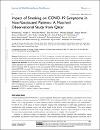Impact of Smoking on COVID-19 Symptoms in Non-Vaccinated Patients: A Matched Observational Study from Qatar
Date
2022Author
Haider, M.Z.Al-Mannai, A.
Al-Sirhan, S.
Elsabagh, A.
Nasser, N.
Al-Quraishi, N.
Ouda, A.
Erradi, K.
Ashour, A.A.
Gupta, I.
Abdulmajeed, J.
Al-Romaihi, H.E.
Bansal, D.
Musa, O.A.H.
Farag, E.A.B.A.
Al-Thani, M.H.J.
Al Moustafa, A.-E.
...show more authors ...show less authors
Metadata
Show full item recordAbstract
Purpose: Predisposition to acute illness from COVID-19 is suggested to correlate with cigarette smoking as it augments the risk of developing cardiovascular and respiratory illnesses, including infections. However, the effects of smoking on COVID-19 symptoms are not well described and controversial. In this study, we aim to explore the associations between smoking and COVID-19 symptoms.
Subjects and Methods: A cross-sectional study using the Ministry of Public Health (MoPH), Qatar database was administered to a Qatari population with confirmed COVID-19 disease who filled in pre-defined phone-call questionnaire between 27th February 2020 and 31st December 2020. We analyzed 11,701 non-vaccinated COVID-19 individuals (2952 smokers and 8749 non-smokers) with confirmed RT-PCR test results. The association of smoking and the presence of symptoms as well as patient characteristics was calculated using Pearson’s Chi-square and Fisher’s exact tests, adjusting for potential covariates.
Results: Compared with the non-smokers, symptomatic COVID-19 infection is significantly higher in smokers. In addition, we found fever as the most common symptom developed in COVID-19 patients followed by cough, headache, muscle ache, and sore throat. As compared to other symptoms, association of smoking with chills and abdominal pain was less evident (P < 0.05 and P < 0.001, respectively). However, both groups showed similar rates of developing cough.
Conclusion: In conclusion, smoking is associated with COVID-19 symptoms frequency in non-vaccinated patients; nevertheless, further investigations are necessary to understand the mechanism of this association which could generate new targets for the management of COVID-19 in smoker patients.
Collections
- Biomedical Research Center Research [810 items ]
- COVID-19 Research [849 items ]
- Medicine Research [1831 items ]
Related items
Showing items related by title, author, creator and subject.
-
Investigation and Comparative Study between Research Methods used in the Five Categories of BIM-Based Built Environment Sustainability Studies
Bouhmoud, Hanane; Loudyi, Dalila; Giordano, Andrea; Azhar, Salman; Farah, Mounia ( Qatar University Press , 2023 , Conference)Using Building Information Modelling (BIM) helped enhance the environmental performances of building and civil infrastructure projects throughout their life cycle. However, the construction industry continues to be one of ... -
Quality of life, sleep quality, depression, anxiety, stress, eating habits, and social bounds in nurses during the coronavirus disease 2019 pandemic in qatar (The PROTECTOR study): A cross-sectional, comparative study
Nashwan, Abdulqadir J.; Villar, Ralph C.; Al-Qudimat, Ahmad R.; Kader, Nisha; Alabdulla, Majid; Abujaber, Ahmad A.; Al-Jabry, Mahmood M.; Harkous, Michel; Philip, Anite; Ali, Raed; Chandra, Prem; Yassin, Mohamed A.; Shraim, Mujahed; Singh, Kalpana... more authors ... less authors ( MDPI , 2021 , Article)There have been numerous concerns regarding the physical and mental health of nurses during the COVID-19 pandemic. Stress, sleep deprivation, anxiety, and depression potentiated nurses’ vulnerability to poor eating habits. ... -
A 3-Year Longitudinal Study of Effects of Parental Feeding Practices on Child Weight Status: The Childhood Obesity Study in China Mega-Cities
Ma, Lu; Yan, Na; Shi, Zumin; Ding, Yixin; He, Siran; Tan, Zhengqi; Xue, Bo; Yan, Yating; Zhao, Cai; Wang, Youfa... more authors ... less authors ( MDPI , 2022 , Article)This study examined the longitudinal associations between parental feeding practices and child weight status, and their potential modification effects by child sex, age, and maternal and paternal educations among children. ...





